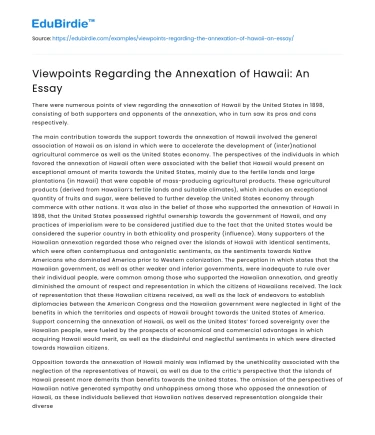There were numerous points of view regarding the annexation of Hawaii by the United States in 1898, consisting of both supporters and opponents of the annexation, who in turn saw its pros and cons respectively.
The main contribution towards the support towards the annexation of Hawaii involved the general association of Hawaii as an island in which were to accelerate the development of (inter)national agricultural commerce as well as the United States economy. The perspectives of the individuals in which favored the annexation of Hawaii often were associated with the belief that Hawaii would present an exceptional amount of merits towards the United States, mainly due to the fertile lands and large plantations (in Hawaii) that were capable of mass-producing agricultural products. These agricultural products (derived from Hawaiian’s fertile lands and suitable climates), which includes an exceptional quantity of fruits and sugar, were believed to further develop the United States economy through commerce with other nations. It was also in the belief of those who supported the annexation of Hawaii in 1898, that the United States possessed rightful ownership towards the government of Hawaii, and any practices of imperialism were to be considered justified due to the fact that the United States would be considered the superior country in both ethicality and prosperity (influence). Many supporters of the Hawaiian annexation regarded those who reigned over the islands of Hawaii with identical sentiments, which were often contemptuous and antagonistic sentiments, as the sentiments towards Native Americans who dominated America prior to Western colonization. The perception in which states that the Hawaiian government, as well as other weaker and inferior governments, were inadequate to rule over their individual people, were common among those who supported the Hawaiian annexation, and greatly diminished the amount of respect and representation in which the citizens of Hawaiians received. The lack of representation that these Hawaiian citizens received, as well as the lack of endeavors to establish diplomacies between the American Congress and the Hawaiian government were neglected in light of the benefits in which the territories and aspects of Hawaii brought towards the United States of America. Support concerning the annexation of Hawaii, as well as the United States’ forced sovereignty over the Hawaiian people, were fueled by the prospects of economical and commercial advantages in which acquiring Hawaii would merit, as well as the disdainful and neglectful sentiments in which were directed towards Hawaiian citizens.
Save your time!
We can take care of your essay
- Proper editing and formatting
- Free revision, title page, and bibliography
- Flexible prices and money-back guarantee
Opposition towards the annexation of Hawaii mainly was inflamed by the unethicality associated with the neglection of the representatives of Hawaii, as well as due to the critic’s perspective that the islands of Hawaii present more demerits than benefits towards the United States. The omission of the perspectives of Hawaiian native generated sympathy and unhappiness among those who opposed the annexation of Hawaii, as these individuals believed that Hawaiian natives deserved representation alongside their diverse neighbors. Critics of the annexation viewed the annexation of the United States as highly unnecessary and pose as a demerit to both the United States and those who initially (and rule) inhabit Hawaii. In addition to the perception that annexing Hawaii would be considered unethical, anti-annexation critics often argue that the annexation of Hawaii establishes further vulnerability in the United States, as the distance between Hawaii and mainland U.S.A would be considered extremely inconvenient, especially in periods of war. Critics believe that Hawaii would be perceived as a weak point (and possibly targeted) by foreign countries (during periods of war), in which the distance from the mainland establishes the vulnerability which the United States possesses during times of war. In addition, critics believe that it would require a remarkable extent of effort and money, as well as sacrifices of the U.S. Navy to establish daily commune between Hawaii and the mainland United States (which involves the regulation of commerce and the protection from foreign invaders). It is considered by the anti-Hawaiian annexation supporters, that Hawaii should not be annexed mainly due to the belief that the annexation of Hawaii would necessitate great expenses and efforts of the United States to resolve the initial vulnerability Hawaii possesses, and the annexation would be considered unethical towards Hawaiian natives. The annexation of Hawaii possessed a major influence concerning the economic prosperity and commercial advancements in the United States. This annexation allows the accelerated development of the United States sugar and fruit industries, which greatly advanced the late-nineteenth and early-twentieth-century economy and granted the United States ready access to the rich fertile soils, plentiful products, and the agricultural atmosphere of the Hawaiian Islands. In addition to developments in commerce and industry, the Hawaiian annexation also contributed towards the conclusion of the Hawaiian monarchy (and those who were associated with royalty), which was replaced by United States democracy. The annexation of Hawaii also contributed towards the incorporation of Hawaii as the 50th state, as well as supporting the ideology concerning confirmation of the existence of imperialism practiced by the United States. The annexation of Hawaii marks in American history that the United States practiced imperialism before it’s later sovereignty.
The annexation of Hawaii contributed towards the development in industry and commerce, as well as the conversion of the Hawaiian monarchy to American democracy, and is considered the result of American imperialism. The annexation of Hawaii possesses multiple impacts on history (including developments in the industry) as well as perspectives including supporters, which appreciates cherish the prospects of merits in which the annexation of Hawaii would concede, and critics, in which valued the native’s representation and believed that Hawaii possesses more cons than pros.






 Stuck on your essay?
Stuck on your essay?

